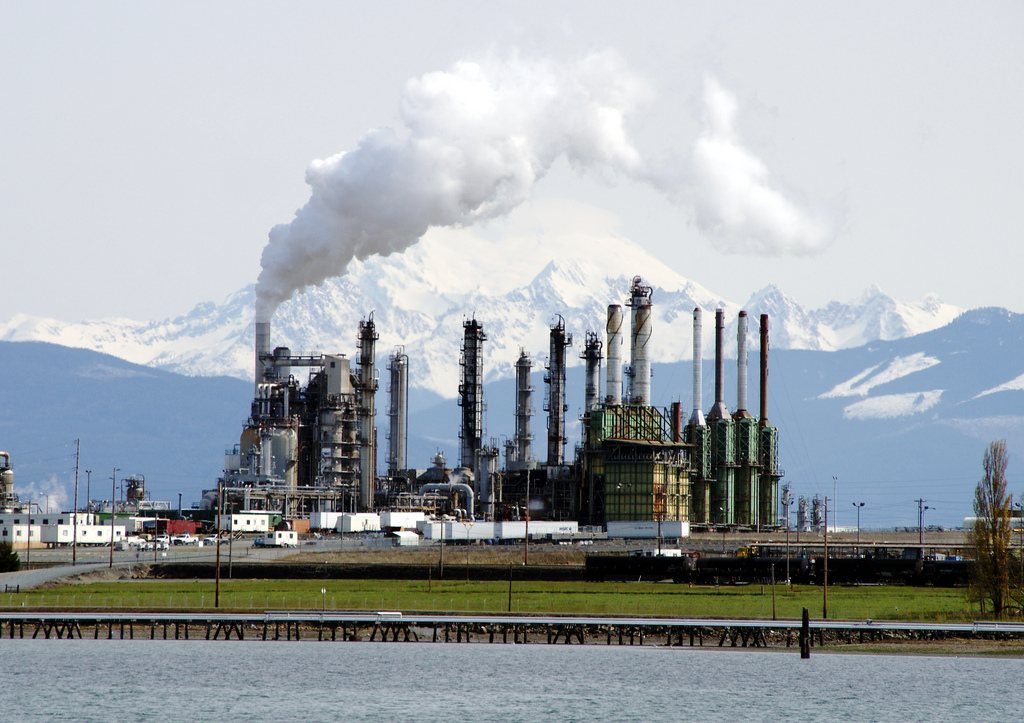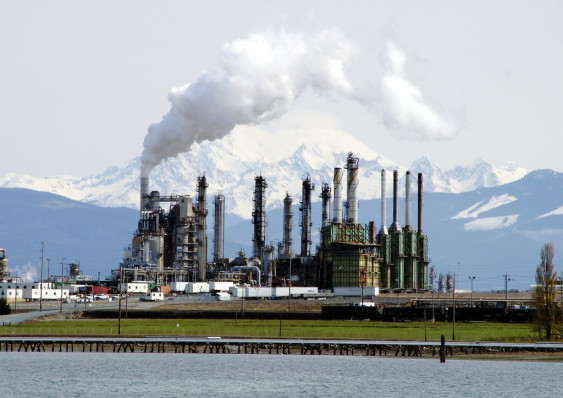Editor’s Note: This article was originally published at Oil Check Northwest and is republished here with the editor’s permission.
Oil Check Northwest released a report just last week on the flow of fossil fuel money into Oregon and Washington over the last 3 election cycles—the most comprehensive catalog to date of the industry’s influence on our region.
The Pacific Northwest is set to make historic advancements for clean air and the environment. In 2016, a broad coalition of Oregon organizations will present a ballot initiative to simultaneously transition off coal and double the state’s Renewable Portfolio Standard.
Meanwhile, in Washington, Governor Inslee has issued a historic executive order to regulate climate-warming pollution through the Department of Ecology. A ballot initiative presented by an alliance of progressive organizations would add financial teeth to the Governor’s declaration by adding a provision to charge polluters for their emissions.
Needless to say, the oil, coal, and gas industries that benefit from the status quo vigorously oppose these reforms. Over the last three election cycles, major extractors, distributors, and refiners of fossil fuels have poured $20.1 million into both states to influence Northwest politics: $7.9 million in Oregon and $12.3 million in Washington.
Through a web of direct donations, PAC contributions, and lobbying expenditures, fossil fuel interests have sought to block, delay, and roll back popular protections for clean air and the environment.
This report breaks down these figures year-to-year and showcases which companies are buying the most influence, which politicians have taken the most, and where this money is undermining clean air and environmental goals.
Key Findings
- Between the 2009-2010 and 2013-2014 election cycles, political spending
- in the region as a whole increased 22.5 percent.
- in Washington increased 29.8 percent.
- in Oregon increased 13 percent.
- The top-spending lobbyist in both states was the Western State Petroleum Association.
- PAC funding was broad and diverse, and funding went far beyond energy sector policy. Several top-earning PACs influenced taxation, state industry, and political parties.
- Overall, legislators who took the most funding were also the most ardent opponents of clean energy policy in each state.
Download the full report from Oil Check Northwest

Fossil Fuel Spending in Oregon, by Oil Check Northwest. (Used with permission.)

Fossil Fuel Spending in Washington, by Oil Check Northwest. (Used with permission.)

Fossil Fuel Spending in the Northwest, by Oil Check Northwest. (Used with permission.)











Thad Curtz
Nick neglects to mention that Carbon Washington’s statewide volunteer organization has been working since April and has already virtually completed the 15,000 to 20,000 hours of signature collecting required to qualify a Washington State initiative.
I-732 revenue neutral carbon tax swap would cut the sales tax 1%, basically eliminate the B&O tax on manufacturing, provide an annual rebate of up to $1,500 to 400,000 working families in the state, and then raise the same amount of money for state programs by taxing fossil fuels and the carbon content of imported electricity. (It would thus provide about 40% more support for low income families affected by higher fuel costs than the $143 million in Governor Inslee’s cap and trade proposal, which the Alliance warmly supported in the last Legislative session…)
The Alliance apparently intends to ask people to do this all over again in order to put a second competing inititative on the ballot, confusing voters and reducing the chances that we’ll be able to get either of them passed…
Steve Erickson
‘A ballot initiative presented by an alliance of progressive organizations would add financial teeth to the Governor’s declaration by adding a provision to charge polluters for their emissions.”
Since this hypothetical initiative has not even been written yet, its premature to call it “presented.”
I-732 will be on the ballot, but its revenue neutral teeth are ignored.
Nick Abraham
Hi Steve and Thad,
I didn’t purposely omit 732, I just gave the Alliance and Renew Oregon’s ballot efforts as examples of the array of work being done in the Northwest to promote a clean energy future.
I hope it didn’t detract from the point of the report that oil and coal interests have a long well financed history of political influence to stop efforts to reduce their industry’s impact.
screen name
Hi Nick,
Would you explain/address the Section 9 the EXEMPTIONS of the initiative 1631?
Kelsey Hamlin
Hello, I’m the communications associate at Sightline. I-1631 exempts one refinery because it’s going to be closed in five years, and Boeing (because it exempts aircrafts). It additionally exempts vehicle drivers. Another one exempts fossil fuels sold or exported out of Washington. This sounds concerning on its face, but is how Washington treats all manufactured goods: taxed at the point of retail sale, not “upstream” when they leave the factory. An oil refinery is basically a factory – it makes gasoline, diesel, etc out of crude oil – so the product is taxed when it’s sold. If it’s sold in Washington it’s taxed in Washington. If it’s sold in Oregon or Idaho or BC (where a lot of our refined fuel goes), then law requires it to be taxed in those jurisdictions. In any case, what 1631 is doing is exactly what we already do for gas taxes and taxes on every other manufactured good.
Further exemptions include diesel or bio-diesel used for agricultural purposes, so it doesn’t impact farmers; fuel provided for lights/electricity businesses so it doesn’t tax a business twice (AKA doesn’t tax before fuel is generated or purchased by the utility); and finally electricity for energy-intensive, trade-exposed (EITE) sectors–these are businesses that produce glass, steel, metal casting, pulp and paper, aluminum, and chemicals.
These are all of the exemptions on I-1631.
Full text: https://www.sos.wa.gov/_assets/elections/initiatives/finaltext_1482.pdf (which includes the Section 9 you reference).
Carol seaman
It seems so ironic that our governor places himself in a “clean energy” position. Seriously? While appearing to work on reducing carbons through an “Alliance” & a convoluted “cap & trade” (what I can’t help but feel Is fakery-albeit last read was a 44p. complicated fakery) he continues to wade around in the slush with oil refinery proposals, oil storage terminal proposals & exploding oil trains with serious & potential human & environmental damages! Coal, too! He hides behind the coat tails of DOE-as if that agency is making the decisions about the Sacrifice of Washington Ports to The Petroleum industry and BNSF.(Former reps. of whom sit on the safety study for the Tesoro proposal in Vancouver!) He can say, “No.” Our legislators, our governor and our Senators Murray & Cantwell are bending over backwards to make it happen…Why? These proposals will make an enormous contribution to carbon emissions if approved-immeasurable. The political process here certainly does not represent the public good- nor the good of the environment. Again, money talks-especially with proposed carbon controls by a purportedly “green” governor who supports oil, coal, natural gas, & methane & their expansion and export in the Evergreen State! Tell me I am wrong…please.